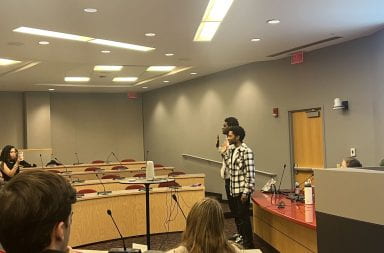North Korea has threatened South Korea with thermonuclear war, but some South Korean students at Ohio State aren’t worried about a potential attack.
“We aren’t really concerned about (the North Koreans),” said SeungHwan Baik, a third-year in biology whose family lives in Seoul, South Korea. “We know they try to get something from us, that is why they are threatening us.”
Baik said in the past his government has tried to talk peacefully and help provide North Korea with rice and money, but now things have changed.
Park Geun-hye became South Korea’s president in February and has taken a harder stance on North Korea by implementing a policy called trustpolitik, which, according to CNN, is “based on deterrence combined with cautious approaches to North Korea.”
Seyoung Lee, a third-year in marketing, said threats have happened before, but this is the first time since South Korea changed presidents.
“This time we have a president who thinks strong against (North Korea),” Lee said.
North Korea and South Korea have technically been at war since their conflict in the early 1950s, which ended in an armistice rather than a peace treaty. An armistice is a temporary suspension of hostilities by agreement between the opponents. North Korea has made threats of nuclear strike against both the U.S. and South Korea, and the United Nations approved sanctions against the country after nuclear testing earlier this year. Tensions have been rising between the countries for months, and while some are discounting it as political rhetoric, others are more fearful.
Lee said the people who think seriously about the threats are the older generation and the males who have to join the army.
Lee, who stays connected with her family in Busan, South Korea, via Skype, said everything remains normal at home and people carry on with their lives, otherwise there could be problems.
“If schools said, ‘This is a problem, you don’t have to come to class,’ or if they say, ‘You don’t have to come into the office,’ people would think totally differently,” she said.
Alex Thompson, a political science professor who teaches international relations, said these threats are different from the past because North Korea has nuclear weapons.
“You can’t really compare this crisis to those in the past since we have this new ingredient – which is North Korean nukes,” Thompson said. “So I think that really grabs the attention of the world.”
Grabbing the attention of the world is a concern for Baik. He said every time the South is threatened, foreign investors worry about their money.
“For example, you have stock in my country,” he said. “And (you say), ‘Oh there’s a war going to happen,’ and so you are going to sell that right? So every foreigner’s going to sell those kinds of stocks and our economy is going to be affected.”
Baik said his generation does not want to be unified as one country because it would mean South Korea would care for North Korea, which is in poor condition.
Lee agreed and said the younger generation feels no draw toward North Korea like in generations past, which have relatives in the country.
“(The older generations) have a lot (of) family there, but now a lot of people who are in that generation died,” she said. “So we don’t have an emotional attachment to North Korea anymore.”


